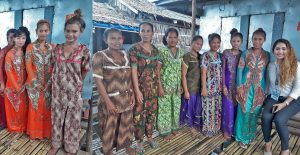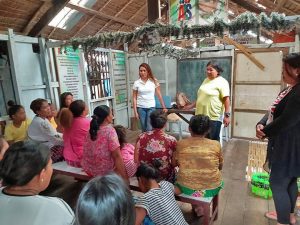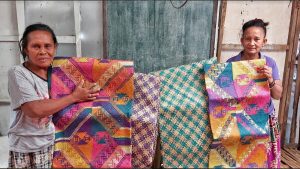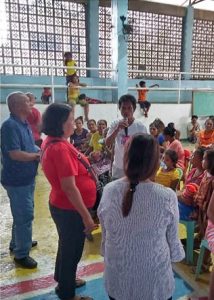Olivia straightens up as she was about to fold the last strip of the dried buli leaf to cap off her day.
Olivia Jawatan, 49 years old, a mother of three, works hard to earn for her family’s needs. For a Badjao like her, it is unlikely that she depends on a sustainable job, or a livelihood. But after enjoying the benefits of one of the government’s programs, she is able to enjoy a livelihood she has learned to love.

The Badjao, like many of the country’s indigenous peoples, are a vulnerable tribe. Forced resettlements, homelessness, and extreme poverty remain the constant challenges to their living. These push them to take the risky path of begging on the streets or diving for coins thrown to them at the pier, to earn a living
Widely known as “sea gypsies” because they live and fish in coastal areas, they are often beyond the reach of government assistance due to their nomadic existence. Yet, a barangay in Surigao City proves this untrue.
Out of their shells
Canlanipa is one of the 54 barangays in the capital of Surigao del Norte. In its barangay’s coastal areas, live an estimated 250 Badjao households. Most of these households have no source of living. Others own small fishing boats, but it was unable to sustain their daily needs. Fortunately, a survey was done in 2009 and Badjao families of Canlanipa were assessed by the Department of Social Welfare and Development (DSWD).
From the surveyed families, 41 households qualified for DSWD’s new program, the Pantawid Pamilyang Pilipino Program (4Ps) – the country’s Conditional Cash Transfer (CCT) Program. 28 families qualified for the regular UCT, while 13 families were qualified for the Modified CCT.
It was a challenge for the qualified families. The program had different conditions that the members would comply with to receive their grants. At the early part of the program’s implementation, they had a hard time complying with the conditions. Olivia shares how hard it is for a Badjao parent like her to understand everything about the conditions of the program.
“Kasagaran sa amo diri dili makabayo mubasa o musuyat. Dako gajud na tabang an amo tribal leader sa pagproseso sa mga rekisitos na kinahanglanon nan 4Ps (Most of us here are illiterate. Our tribal leader is really of great help to us in processing the requirements needed for the Program),” Olivia said.
Badjaos, like other IP groups, depend on their tribal leaders. Fortunately, one of their more dependable and strong-willed leaders, Dahila Araman, was one of the beneficiaries of the program.

She was chosen as one of the program’s parent-leaders in their barangay because of her inherent virtues, wisdom, and charisma. Prior to being a parent-leader, she has served her community for over 34 years, ensuring peace and order among tribal members. She rendered service with her compassion, helping the community whenever there are problems that need to be addressed at all times.
Though language barrier is an issue, Dahila sees to it that her members are in compliance with the conditions of 4Ps such as keeping their children in school, maintaining health check-ups, and attending the monthly Family Development Sessions (FDS). During these times, she serves as the translator of their discussions, should her members need translating about the contents of the modules they are using. It is also a breather for their City Link assigned to have Dahila as the parent leader since she can easily provide her service to all, ensuring that no Badjao is left out.
Change of living
“Pagmulaong gani na Badjao, an huna-huna dajon nan mga tawo manlimosay kami. Pero diri sa amo barangay, taghinay-hinajan na namo pagbag-o an amo panginabuhi tungod sa amo mga nakat-unan sa FDS (When you say Badjao, the people will automatically think that we are beggars. But here in our barangay, we are slowly changing our way of life, especially in terms of our livelihood – and this is because of what we learned during our FDS),” Dahila said, as she explained the importance of attending the monthly FDS.
In Chapter 13 of the Program’s operations manual, the grantees have the most crucial role in achieving transformation and development of the family thus, “it designed the FDS to have a venue for household grantees to enhance and acquire new skills and knowledge in responding to their roles.” Moreover, the second module (Responsible Parenthood), presents a topic on Family Resource Management, in which the grantees are taught of income-generating strategies and marketing procedures. One of these is buli weaving.
“Gikan ini sa dahon sa buli, amo dajon ibuyad sa suga. Pagmamaya na, amo na dajon sugdan an paghimo sa banig. Tungod kay waya may amo hamok na materyales, amo ra kinamuton (These are from the strands of buli/buri palm. When it dries, we start the weaving process. Since we do not have equipment, we manually weave these mats),” Olivia shared.

Buri (Corypha Elata), is a large fan palm commonly found in tropical countries. Its leaves are sliced into strips, sun dried and dyed.
An arduous and very tedious process, buli weaving requires hard work, determination and patience from the Badjao women. Despite its being still a callow enterprise, it has the potential of becoming sustainable in the long run as it is linked to economic opportunities, a characteristic that, for Paterna M. Ruiz, Undersecretary of the Anti-Poverty Commission (NAPC), emphasized as vital to the alleviation of poverty, even in small ways.
Financial literacy
Data presented by NAPC showed that 21.9 million or 21.6 percent of Filipinos are income poor. Under the Department’s Major Thrusts in line with the Philippine Development Plan 2017-2022, it seeks to lay down foundation for inclusive growth, a high-trust and resilient society, and a globally-competitive knowledge economy.
“Dako an amo pagpasalamat sa DSWD-4Ps kay kuman naanam-anam na pagkakita sa mga tawo na dili kami taman ra sa pagpangajo sa kadayanan sa Surigao, kon dili naningkamot sab kami para mulambo sa kinabuhi (We owe our big thanks to DSWD-4Ps because now the people can slowly see that we are not just beggars on the streets of Surigao, but we are working hard to have a good life),” Dahil said.

Olivia and Dahila are just two of the Badjao residents in Surigao enjoying the benefits of the Pantawid Pamilya Program. With their relentless pursuit to provide for their families, and change the image of the Badjao’s, they strive to be productive citizens by putting into action what they learned from the program.
Without a doubt, their financial literacy has reflected the efforts of the Department in attaining its service brand – DSWD May Malasakit, and for the Badjao community, this is just the start. ###(Social Marketing Section/DSWD Field Office Caraga)

